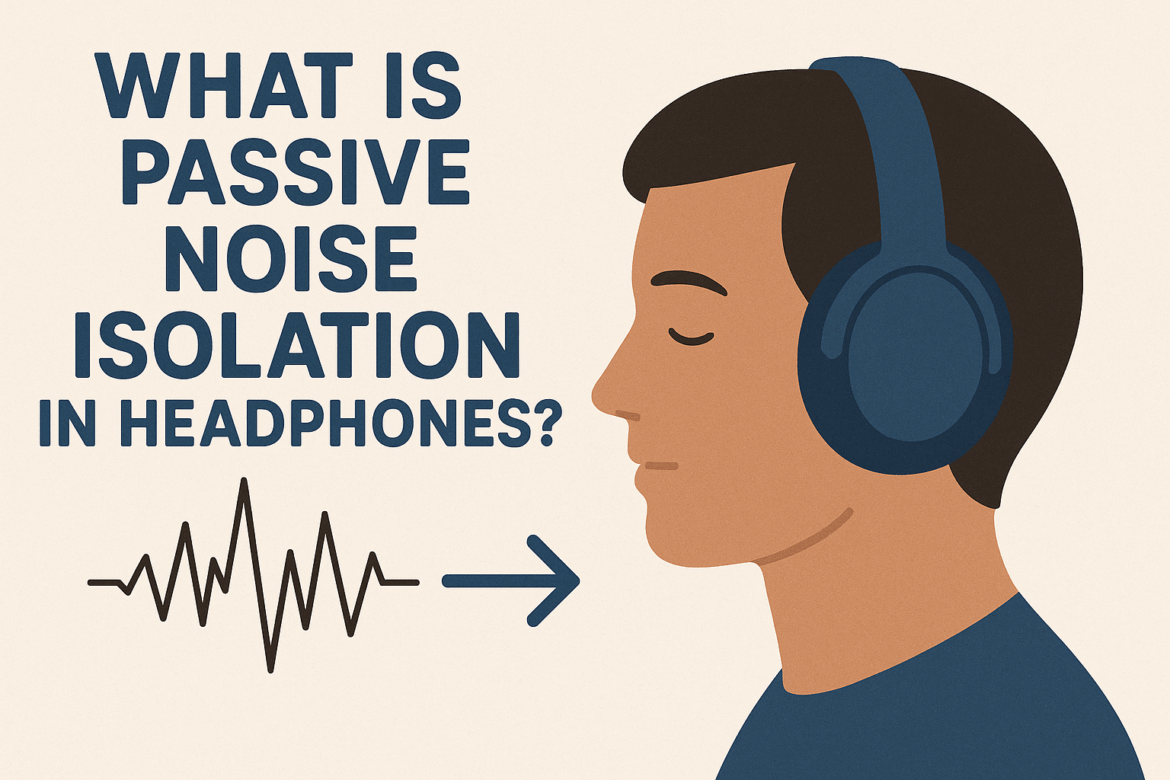Pasif Gürültü İzolasyonu Nedir? Kulaklıklar?
Her notanın ve fısıltının önemli olduğu kişisel ses dünyasında, kulaklıklardaki pasif gürültü izolasyonu, sürükleyici ses deneyimlerinin sessiz bir koruyucusu olarak ortaya çıkıyor. Bu teknoloji sadece bir özellik değil; günlük hayatın kakofonisinin kaybolup sizi müziğinizle, podcast'inizle veya sesli kitabınızla baş başa bıraktığı bir dünyaya açılan bir kapı. Peki pasif gürültü izolasyonu tam olarak nedir ve sihrini nasıl gerçekleştirir? Gelin, bu olağanüstü özelliğin inceliklerini inceleyelim ve özünü ortaya çıkaralım.
Pasif Gürültü İzolasyonunu Anlamak
Pasif gürültü izolasyonu, özünde kulaklıkların ortam gürültüsünü elektronik müdahale yerine fiziksel yollarla engellemek için kullandığı bir yöntemdir. Dış sesleri engellemek için mikrofon ve elektronik devreler kullanan aktif gürültü engelleme teknolojisinin aksine, pasif gürültü izolasyonu kulaklıkların tasarımına ve malzemelerine dayanır. Bu, sizi dış dünyadan doğal olarak koruyan ve müziğin ön plana çıkmasını sağlayan bir kulaklık gibidir.
Pasif Gürültü İzolasyonunun Arkasındaki Mekanik
Pasif gürültü izolasyonunu gerçekten takdir etmek için, onu etkili kılan mekanizmaları inceleyelim. Konsept aldatıcı derecede basit: Kulaklarınız ile çevreniz arasında fiziksel bir bariyer oluşturun. Bu, izolasyonun genel etkinliğine katkıda bulunan çeşitli tasarım öğeleri ve malzemelerle sağlanır.
1. Kulaklık Tasarımı ve Malzemeleri
Kulaklıkların tasarımı ve malzemeleri, pasif gürültü izolasyonunda önemli bir rol oynar. kulak üstü Geniş kulak pedleriyle bilinen kulaklıklar bu alanda mükemmeldir. Bu kulaklıklar, kulakları tamamen sararak dışarıdan gelen gürültünün içeri sızmasını engelleyen bir sızdırmazlık oluşturur. Hafızalı köpük ve deri gibi kullanılan malzemeler, bu sızdırmazlığı daha da artırarak hem konfor hem de izolasyon sağlar.
Kulak üstü kulaklıklar, daha küçük olmalarına rağmen, benzer detaylara dikkat edilerek tasarlandıklarında iyi bir pasif gürültü izolasyonu sağlayabilirler. Önemli olan, kulaklığın uyumu ve kullanılan malzemelerdir. Kulağa tam oturması, kulaklığın kaymamasını sağlayarak ortam gürültüsüne karşı bariyeri korur.
2. Yastıklama ve Dolgu
Kulaklıkların yastıklama ve dolgu malzemesi, pasif gürültü izolasyonuna önemli ölçüde katkıda bulunur. Yüksek kaliteli dolgu malzemesi, konforu artırmanın yanı sıra kulakların etrafında etkili bir sızdırmazlık oluşturmaya da yardımcı olur. Hafızalı köpük, kullanıcının başının şekline uyum sağlayarak izolasyonu en üst düzeye çıkaran kişiselleştirilmiş bir uyum sağlaması nedeniyle popüler bir tercihtir. Dolgu malzemesi, yumuşaklık ve sertlik arasında bir denge kurmalı ve sızdırmazlıktan ödün vermeden konfor sağlamalıdır.
3. Sıkma Kuvveti
Genellikle göz ardı edilen kulaklıkların sıkıştırma kuvveti, pasif gürültü izolasyonunda önemli bir faktördür. Aşırı basınç uzun süreli kullanımda rahatsızlığa yol açabilirken, orta düzeyde bir sıkıştırma kuvveti kulaklıkların güvenli bir şekilde yerinde kalmasını sağlayarak izolasyonun bütünlüğünü korur. Üreticiler, etkili gürültü izolasyonu ve kullanıcı konforu arasında bir denge kurmak için bu özelliği özenle tasarlar.
Pasif Gürültü İzolasyonunun Faydaları
Pasif gürültü izolasyonu, dinleme deneyimini geliştiren bir dizi avantaj sunar. Bu avantajlardan bazılarını inceleyelim:
1. Doğal Ses Kalitesi
Pasif gürültü izolasyonu elektronik işleme dayanmadığı için sesin doğal ses imzasını korur. Hiçbir değişiklik veya bozulma olmadan, müziğin keyfini sanatçının tasarladığı gibi çıkarabilirsiniz. Bu saf ses kalitesi, müzikseverler ve müzik tutkunları için önemli bir cazibe kaynağıdır.
2. Pil Bağımlılığı Yok
Pasif gürültü izolasyonunun öne çıkan özelliklerinden biri, pil veya güç kaynaklarından bağımsız olmasıdır. Çalışmak için güç gerektiren aktif gürültü önleyici kulaklıkların aksine, pasif modeller her zaman kullanıma hazırdır. Bu da onları uzun yolculuklar veya şarjın zor olduğu durumlar için güvenilir bir seçenek haline getirir.
3. Maliyet Etkinliği
Pasif gürültü izolasyonlu kulaklıklar, aktif gürültü önleyici muadillerine kıyasla genellikle daha uygun fiyatlıdır. Bu maliyet etkinliği, kullanıcıların bütçelerini zorlamadan yüksek kaliteli ses izolasyonunun keyfini çıkarmalarını sağlar. Performanstan ödün vermeden değer arayanlar için pratik bir seçenektir.
Pasif ve Aktif Gürültü İzolasyonunun Karşılaştırılması
Pasif gürültü izolasyonunun inceliklerini daha iyi anlamak için, onu aktif gürültü izolasyonuyla karşılaştırmak faydalı olacaktır. Aşağıdaki tablo, iki teknoloji arasındaki temel farkları vurgulamaktadır:
| Özellik | Pasif Gürültü İzolasyonu | Aktif Gürültü İzolasyonu |
|---|---|---|
| Yöntem | Fiziksel bariyer | Elektronik ses iptali |
| Güç Gereksinimi | Hiçbiri | Pil veya güç kaynağı gerektirir |
| Ses Kalitesi | Doğal, değiştirilmemiş | Hafif bozulma potansiyeli |
| Maliyet | Genellikle daha uygun fiyatlı | Tipik olarak daha pahalı |
| Verimlilik | Tasarım ve uyuma göre değişir | Tutarlı etkinlik |
Pasif Gürültü İzolasyonu İçin Doğru Kulaklığı Seçmek
Pasif gürültü izolasyonu için doğru kulaklığı seçmek, tercihleriniz ve ihtiyaçlarınız doğrultusunda çeşitli faktörleri göz önünde bulundurmayı gerektirir.
1. Uygunluk ve Konfor
Etkili pasif gürültü izolasyonu sağlamak için kulaklığın kulağa tam oturması çok önemlidir. Kulaklarınızın şekline uyum sağlayan ayarlanabilir kafa bantları ve kulaklıklar sunan modelleri tercih edin. Konfor, özellikle uzun süreli dinleme seansları için çok önemlidir.
2. Malzeme Kalitesi
Kulaklık kapları ve dolgusu için yüksek kaliteli malzemelerden yapılmış kulaklıklara yatırım yapın. Deri veya suni deri malzemeler iyi bir sızdırmazlık sağlar ve dayanıklılığı artırır. Hafızalı köpük dolgu, kişiselleştirilmiş konfor için mükemmel bir seçimdir.
3. Kullanım Senaryoları
Kulaklıkları nerede ve nasıl kullanmayı planladığınızı göz önünde bulundurun. Sık sık seyahat ediyor veya işe gidip geliyorsanız, üstün gürültü izolasyon özelliklerine sahip kulak üstü modelleri tercih edin. Öte yandan, günlük kullanım için daha kompakt bir tasarım tercih ediyorsanız, kulak üstü modeller daha uygun olabilir.
4. Bütçe
Bütçenizi belirleyin ve bu aralıktaki seçenekleri inceleyin. Pasif gürültü izolasyonlu kulaklıklar daha uygun fiyatlı olsa da, saygın bir markaya yatırım yapmanın genellikle daha iyi yapı kalitesi ve ses performansı sağladığını unutmayın.
Sonuç: Sessizliği Kucaklamak
Kulaklıklarda pasif gürültü izolasyonu, basit bir özellikten çok daha fazlasıdır; dış dünyanın dikkat dağıtıcı unsurlarından uzak, ses dolu bir dünyaya kaçış için bir davettir. Bu teknolojinin işleyişini ve faydalarını anlayarak, ihtiyaçlarınıza en uygun kulaklığı seçerken bilinçli kararlar verebilirsiniz. İster kusursuz ses kalitesi arayan bir ses tutkunu olun, ister huzur arayan bir gezgin, pasif gürültü izolasyonu, sürükleyici ses deneyimlerine açılan bir kapı sunar. Ses yolculuğunuza çıkarken, sessizliğin sizi sarmasına izin verin ve her notanın netlik ve hassasiyetle yankılanmasını sağlayın.
Son Güncelleme: 28 Ağustos 2025
